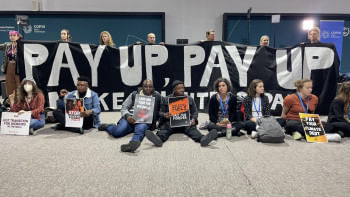A bizarre shift in South Korean politics

South Korean President Park Geun-hye has been impeached on December 9, 2016, following a bizarre scandal.
On October 24, 2016 JTBC (South Korean nationwide cable TV network) broke a story that President Park allowed her close friend Ms. Choi Soon-sil to revise her public speeches and meddle in the affairs of the state. Ms. Choi had no official position in the government but was very close to Ms. Park. The following day Ms. Park admitted her close ties with Ms. Choi, apologised for her carelessness but denied any wrong doing. But by then the stage was set for indictment.
Hundreds of thousands of protesters held peaceful rallies every Saturday in Seoul since October demanding Ms. Park's resignation. The news of impeachment was greeted by people gathered in front of the Parliament chanting, "We won, we won".
Ms. Park has handed over official powers to unelected Prime Minister Hwang Kyo-ahn (59) who will be acting President until the Constitutional Court gives, within six months, its verdict on the legality of the impeachment. Ms. Park cannot be removed until at least 6 out of 9 judges of the Constitutional Court agree. She may even regain her Presidency as has happened with President Roh Moo-hyun (2003-2008). If Ms. Park is eventually removed she may face criminal prosecution.
The impeachment motion, moved on December 3, was voted by 234 members of the 300-seat House, much more than the two-third majority required. The ruling centre-right Saenuri Party has 129 seats. The opposition parties – Democratic Party (Social Liberalism, 122 seats), People's Party (Centrism, 38 seats), Justice Party (Progressive, 6 seats) and independents (5 seats) – together have 171 seats. Though it was a secret ballot it is clear that Saenuri is split into two, one faction joining the motion.
Ms. Park, the first female President of South Korea, was elected from the Saenuri Party in December 2012 taking office in February 2013 for five years. She is the daughter of assassinated President Park Chung-hee, the military leader of South Korea at that time. Her mother was assassinated in 1974. She fought the election on an anti-corruption platform and conspicuously stayed away from her siblings to avoid allegation of nepotism. She was seen incorruptible, who has devoted her life to public service.
Who is Ms. Choi Soon-sil? She is the daughter of Mr. Choi Tae-min, whom many described as Korea's Rasputin, was a pseudo-Christian leader who set up a cult called the Church of Eternal Life. When her mother was killed in 1974 by a North Korean spy, Ms. Park got to know Mr. Choi, who claimed that he was visited by the soul of Ms. Park's late mother, who asked him to guide her. Mr. Choi became Ms. Park's mentor and amassed considerable wealth and power. In 1979 President Park Chung-hee was assassinated and by that time Ms. Park had become fast friend of Mr. Choi's daughter Ms. Choi Soon-sil. That relationship became deeper after the lonely Ms. Park became President.
Though she held no official position, Ms. Choi became increasingly powerful because of her closeness to Ms. Park. Ms. Choi started influencing policy matters and handled classified documents. She also used her position to pressure Korean conglomerates and raked up USD 70 million as donations for her two foundations. Whether Ms. Park was personally involved in these ventures that are being investigated. In return for donations Ms. Choi apparently promised pecuniary benefits to the companies. Indeed, it was a serious breach of trust by Ms. Park.
Ms. Park's impeachment has implications for Korea's security, economy and political future. Ms. Park's removal may embolden the ever threatening nuclear-armed North Korea to test US resolve to protect South Korea. As Donald Trump attempts to rearrange his security policy towards East Asia he may ask Seoul, a steadfast ally in the region, to pay more for providing American security. Donald Trump's ill-advised telephone conversation with Taiwan President, that has angered Beijing, may have difficult fallout on South Korea.
South Korea is an economic power-house but this scandal has pulled out several top corporate leaders to the parliament for hearing. Lawmakers wanted to find out whether the conglomerates (chaebols) were pressured by Ms. Park or her friend to make donations. During 2016 Korean exports declined, government debt increased and household debt rose. The GDP growth declined to 2.7 percent in 2016 compared to 3.3 percent in 2014. There is possibility of further slowing down because of problems in chaebols such as Samsung Electronics, Hyundai motors and Hanjin Shipping.
The political landscape may also change as public awareness towards corruption has become louder as demonstrated by the mass rallies against Ms. Park. Proud Koreans were deeply angered and felt ashamed for what their President had done. There may be real political reforms and cleaner politics. For instance, instead of a single five-year Presidency term to go for two four-year terms for a President. The interface between the ruling class and the chaebols may be strengthened further.
The impeachment has already kicked-off the race for the next Presidential election. Ms. Park said she would remain defiant and wait with "calm and clear mind" while the Court comes up with its verdict. The faction supporting Ms. Park would like her to remain in office, even if without powers, to regain Saenuri's lost credibility before the election. Saenuri leaders worry that a progressive opposition President may overturn Ms. Park's relations with Japan, North Korea and China.
Once vastly popular, Ms. Park's approval rating plummeted drastically to 4 percent from 40 percent when the scandal broke out. It is sad to see the scion of a political family go down so disgracefully for sheer indiscretion. However, public outcry at political scandals was taken seriously by the lawmakers, reflecting that democracy in Korea was going strong.
The writer is former Ambassador and Secretary.


 For all latest news, follow The Daily Star's Google News channel.
For all latest news, follow The Daily Star's Google News channel. 



Comments